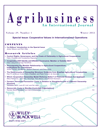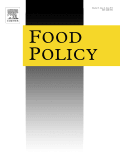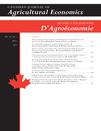
Agribusiness
Scope & Guideline
Exploring sustainable solutions for modern agribusiness challenges.
Introduction
Aims and Scopes
- Economic Efficiency in Agriculture:
The journal emphasizes studies that assess the economic efficiency of agricultural practices, including analyses of production costs, resource allocation, and technological adoption. - Consumer Behavior and Preferences:
Research often explores consumer preferences and behaviors regarding food products, including willingness to pay for quality attributes, sustainability, and health-related claims. - Sustainable Agricultural Practices:
The journal promotes investigations into sustainable agricultural methods and their impact on productivity, environmental health, and economic viability. - Supply Chain Dynamics:
A significant focus is placed on understanding supply chain dynamics in agribusiness, including market integration, risk management, and the role of cooperatives. - Policy Impact Analysis:
The journal frequently publishes analyses on the implications of agricultural policies, trade agreements, and market regulations on local and global agribusinesses. - Technological Innovations in Agriculture:
The integration of technology in agriculture, such as digital farming tools and biotechnology, is a key area of research, assessing how these innovations affect productivity and market access. - Global Trade and Agricultural Markets:
Research that examines the effects of global trade dynamics, including trade agreements and geopolitical influences, on agricultural markets is a core component of the journal's scope.
Trending and Emerging
- Consumer Acceptance of Novel Food Technologies:
There is a growing focus on consumer acceptance of new food technologies, including genetic modification and plant-based alternatives, highlighting the importance of consumer perceptions in agribusiness. - Sustainability and Climate Resilience:
Research on sustainability practices and climate resilience strategies is increasingly prevalent, reflecting a global urgency to address environmental challenges in agriculture. - Digital Transformation in Agriculture:
The emergence of digital tools and platforms in agriculture, including e-commerce and precision agriculture, is a key trend, showcasing how technology can improve efficiency and market access. - Impact of Geopolitical Factors on Agriculture:
Studies examining the impact of geopolitical factors, such as trade wars and international conflicts, on agricultural markets and supply chains are becoming more prominent. - Health and Nutrition-focused Agricultural Products:
There is an increasing trend towards research on health and nutrition, particularly regarding how agricultural products can enhance food security and public health outcomes. - Behavioral Economics in Food Choices:
Emerging research utilizing behavioral economics to understand food choices and consumer behavior is gaining traction, providing insights into how to promote healthier and sustainable eating habits.
Declining or Waning
- Traditional Crop Production Methods:
There has been a noticeable decrease in research focused solely on traditional crop production methods without the integration of modern techniques or sustainability considerations. - Local Food Systems without Economic Context:
Studies purely centered on local food systems that lack economic analysis are becoming less common, as the journal shifts towards more comprehensive evaluations that include economic viability. - Single-Factor Agricultural Studies:
Research that examines single factors affecting agriculture, such as climate or policy, without considering broader systems and interactions is being published less frequently. - Basic Agricultural Education Studies:
Papers focused solely on agricultural education without practical applications or implications for agribusiness practices are declining in favor of more applied research.
Similar Journals

Australasian Agribusiness Review
Connecting Scholars and Practitioners in AgribusinessAustralasian Agribusiness Review, published by the University of New England's Business School Center for Agribusiness, is a premier journal dedicated to advancing the study and practice of agribusiness in the Australasian region and beyond. With a commitment to fostering high-quality research, this journal serves as a crucial platform for scholars and industry professionals alike, offering insights into contemporary issues, innovations, and challenges within the agribusiness sector. Although it currently does not operate on an open access model, its publications are critical for anyone keen on understanding the economic, social, and environmental dimensions of agribusiness. The ISSN 1833-5675 and E-ISSN 1442-6951 uniquely identify this resource, making it easily searchable for researchers and academics. Engaging with this journal will equip readers with a deeper understanding of agribusiness dynamics and contribute to the ongoing conversation around sustainable practices in the industry.

PAKISTAN JOURNAL OF AGRICULTURAL SCIENCES
Pioneering Research in Crop and Soil SciencesWelcome to the Pakistan Journal of Agricultural Sciences, a prominent platform for disseminating vital research findings in the fields of agronomy, crop science, food science, plant science, and soil science. Published by the prestigious University of Agriculture in Faisalabad, this journal aims to enhance the scientific discourse surrounding agricultural innovation and sustainability in Pakistan and beyond. With an ISSN of 0552-9034 and E-ISSN of 2076-0906, the journal serves as a valuable resource for researchers, professionals, and students interested in cutting-edge agricultural developments. As of 2023, the journal is ranked in the Q3 category for Agronomy and Crop Science as well as Food Science and positioned in Q4 for Plant and Soil Science, highlighting its growing impact within a competitive academic landscape. While the Pakistan Journal of Agricultural Sciences is not currently open access, it provides a comprehensive archive of research converging from 2011 to 2024, ensuring that critical knowledge remains accessible to those striving to advance the agricultural sciences. Join us in our mission to foster innovation and support sustainable practices in agriculture.

FOOD POLICY
Empowering research to drive effective food policy.FOOD POLICY, published by Elsevier Science Ltd, is a premier journal in the fields of Development, Economics, Food Science, and Policy studies, with a distinct focus on the intersection of food systems and policy frameworks. With an impact factor that places it in the Q1 category across five key disciplines in 2023, this journal is recognized for its rigorous research and influential contributions to the understanding of food-related governance and socio-economic dynamics. Its strong Scopus rankings, including a startling 25th position in Sociology and Political Science and 10th in Development, emphasize its critical role in shaping contemporary discourse around food security, agricultural policies, and sustainable practices. Although it operates under a traditional access model, FOOD POLICY remains an essential resource for researchers, practitioners, and students seeking to explore innovative policy solutions and their socio-economic implications. With a rich publication history stretching from 1975 to 2024, this journal strives to influence both academic thought and real-world practices in food policy.

Agricultural and Food Economics
Bridging the gap between agriculture, food systems, and economic policy.Agricultural and Food Economics is a leading journal published by SPRINGERNATURE, dedicated to the advancement of research in the interconnected fields of agriculture, food systems, and economic analysis. Established in 2013 and operating under an Open Access model, this journal serves as a vital platform for scholars and practitioners to disseminate innovative findings and insights that influence policy and practice. With a notable impact reflected in its 2023 quartile rankings—Q1 in Agricultural and Biological Sciences (miscellaneous), Q2 in Economics and Econometrics, and Q1 in Food Science—this journal is recognized for its rigorous scholarly output. It ranks among the top resources in its domain, with Scopus ranks placing it in the 88th percentile for Agricultural and Biological Sciences and the 79th percentile for Economics. The journal covers a broad spectrum of topics, including sustainable agricultural practices, the dynamics of food markets, and the economic implications of food policies. Researchers, professionals, and students alike will find valuable insights and comprehensive analyses that contribute to the ever-evolving discourse on food and agriculture.

African Journal of Agricultural and Resource Economics-AFJARE
Connecting researchers to shape Africa's agricultural landscape.African Journal of Agricultural and Resource Economics (AFJARE) is a dynamic publication dedicated to advancing the fields of agricultural and resource economics within the context of Africa. Published by the African Association of Agricultural Economists, this journal serves as a vital platform for researchers, professionals, and students to disseminate their findings and engage with contemporary issues affecting the agricultural sector across the continent. With an ISSN of 1993-3738 and an E-ISSN of 1993-3738, AFJARE aims to reach a wide audience through its commitment to open access, ensuring that crucial research is accessible to all. The journal has recently established itself in the academic landscape, achieving a Q3 ranking in Agricultural and Biological Sciences and a Q4 ranking in Economics and Econometrics for 2023. Covering a diverse scope from 2018 to 2023, AFJARE encourages submissions that explore innovative economic strategies and policies that can foster agricultural development and resource management in Africa. With its growing impact and relevance, AFJARE is poised to become a cornerstone in the discourse on agricultural economics in Africa and beyond.

JOURNAL OF AGRICULTURAL ECONOMICS
Pioneering research for a sustainable agricultural economy.JOURNAL OF AGRICULTURAL ECONOMICS, published by Wiley, is a leading scholarly journal dedicated to the field of agricultural economics. Since its inception in 1928, the journal has provided a platform for rigorous research, offering insights and analysis on the economic aspects of agriculture, food production, and rural development. With an impressive impact factor and ranked in the Q1 category in both Agricultural and Biological Sciences as well as Economics and Econometrics, it stands among the top-tier publications in its field. The journal's ISSN is 0021-857X, and it also has an E-ISSN of 1477-9552. Researchers, professionals, and students seeking to enhance their understanding of agricultural economic policies and practices will find invaluable resources, empirical studies, and theoretical discussions within its pages. The JOURNAL OF AGRICULTURAL ECONOMICS remains an essential conduit for advancing knowledge and shaping discussions that matter in the global agricultural economy.

JOURNAL OF AGRICULTURAL AND RESOURCE ECONOMICS
Bridging theory and practice in agricultural economics.Journal of Agricultural and Resource Economics is a pivotal platform in the realm of agricultural and resource economics, published by the Western Agricultural Economics Association. Since its inception, the journal has embraced an Open Access model, fostering widespread dissemination of research findings to benefit both scholars and practitioners in the field. The journal operates within an impressive global ranking framework, resting in Q2 across several pertinent categories including Agronomy and Crop Science, Animal Science and Zoology, and Economics and Econometrics. With its ISSN 1068-5502 and E-ISSN 2327-8285, it has garnered attention for its rigorous academic standards and impactful contributions to the discourse on resource management and agricultural practices. Researchers, professionals, and students alike will find the journal's ongoing commitment to advancing knowledge invaluable, with publications that span from 1996 to 2024 capturing evolving trends and insights in the sector.

Economia Agraria y Recursos Naturales
Exploring Sustainable Solutions for Agriculture and NatureEconomia Agraria y Recursos Naturales, published by UNIV POLITECNICA VALENCIA, EDITORIAL UPV, is a prominent open-access journal that has been serving the fields of agricultural and biological sciences, environmental science, and geography since 2001. With an ISSN of 1578-0732 and an E-ISSN of 2174-7350, this journal is dedicated to publishing high-quality research that contributes to the sustainable management of natural resources and agricultural practices. The journal invites scholars, practitioners, and students to explore and share innovative findings that address pressing environmental challenges. While currently categorized in the lower quartiles (Q4) for various disciplines in 2023, its open-access model ensures wide dissemination and visibility for authors and their work, aligning with the growing trend towards accessibility in academic publishing. Positioned in Spain, Economia Agraria y Recursos Naturales is a valuable resource for those seeking to engage with the intersection of agriculture, environmental studies, and policy planning within a global context.

Custos e Agronegocio On Line
Navigating the complexities of agribusiness with scholarly rigor and practical relevance.Custos e Agronegocio On Line is a distinguished open-access journal published by the Universidade Federal Rural de Pernambuco, specifically within its Departamento de Administração. Since its inception in 2005, this journal has been committed to disseminating high-quality research in the fields of accounting and agronomy, focusing on the intersections between economic practices and agricultural advancements. With a range of topics that cater to both scholarly and practical interests, the journal serves as a vital resource for researchers, professionals, and students navigating the complexities of agribusiness in Brazil and beyond. Despite its Q4 rankings in various categories, Custos e Agronegocio On Line provides a platform for innovative insights and discussions aimed at improving practices within its fields, reinforcing its importance in today’s dynamic agronomic and economic landscapes. As it converges the experience from 2009 to 2023, the journal is well-positioned to support ongoing dialogue and research in a rapidly evolving industry.

CANADIAN JOURNAL OF AGRICULTURAL ECONOMICS-REVUE CANADIENNE D AGROECONOMIE
Navigating the Future of Food Security and SustainabilityCanadian Journal of Agricultural Economics - Revue Canadienne d’Agroéconomie, published by Wiley, is a premier journal dedicated to the innovative and interdisciplinary study of agricultural economics. With an impressive impact factor highlighting its significance, this journal consistently ranks in the Q1 quartile across multiple categories, including Agronomy and Crop Science, Animal Science and Zoology, Ecology, Economics and Econometrics, and Global and Planetary Change. As part of its robust content, the journal spans articles from 1952 to 2024, contributing valuable insights into the interface of agricultural practices and economic theory. Researchers and professionals in the field will find this journal essential for exploring critical issues affecting agriculture, food security, and sustainability in a global context. Despite its traditional publishing model, the journal's rigorous peer-review process ensures high-quality scholarly contributions that are pivotal for advancing knowledge and academic discourse in agricultural economics.